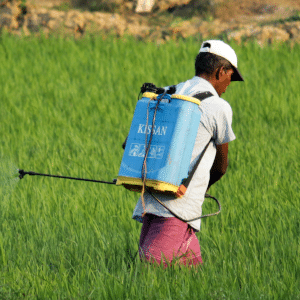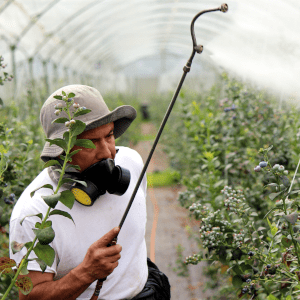 H.R. 8467, also known as the Farm, Food, and National Security Act of 2024, is a bill intended to provide for the continuation and reform of agricultural programs and additional programs relating to the Department of Agriculture through the fiscal year of 2029.
H.R. 8467, also known as the Farm, Food, and National Security Act of 2024, is a bill intended to provide for the continuation and reform of agricultural programs and additional programs relating to the Department of Agriculture through the fiscal year of 2029.
However, the dangerous bill could lead to harm to the health of people and the environment, and could negatively impact hungry families. In particular, it would block existing state laws regulating the use of harmful chemicals around schools and public parks, and it could protect Bayer and other pesticide manufacturers from having to settle with victims of pesticide exposure.
The Dangers of the House Farm Bill
H.R. 8467 would undermine local pesticide protections, protect pesticide manufacturers, harm the environment and divert funds from SNAP programs.
Undermining Local Pesticide Protections
Unfortunately, farm pesticide use is often relied upon to increase crop yields, because it’s expensive to have organic farms grown by organic farmers. The problem with this is that using chemical pesticides for pest management can have harmful effects on the health of people.
Under FIFRA, pesticide legislation’s floor is set by the EPA. This means that localities and states generally aren’t allowed to permit the use of organic or synthetic pesticides which are prohibited by the EPA.
Local and state governments often end up having much better information regarding the risks of pest control methods which are unique to their areas. Because of this, municipalities all over the country have passed restrictions upon the use of pesticides to control insect pests near parks, schools and other areas which are ecologically sensitive in order to protect wildlife and communities from being harmed by pesticide applications.
H.R. 8467 would entirely prohibit local restrictions like these, leaving localities with no power to protect themselves from the adverse effects of pesticides in agricultural use.
Because of this, kids would be in more danger because of the risk between pesticide/herbicide exposure and Parkinson’s disease as well as other diseases like non-Hodgkin lymphoma.
Protecting Pesticide Manufacturers
The use of pesticides to control weeds and insect infestations presents serious, widespread risks to the health of humans, especially for landscapers, farm workers, and other populations which are heavily exposed to chemical use. While pesticides are a useful tool to kill insects and weeds, the harms they have cause people have led to lawsuits against the chemicals’ manufacturers, often resulting in large jury awards or settlements.
Bayer, the manufacturer of Roundup, faces billions of dollars in legal liability regarding those who have been exposed to glyphosate and later developed non-Hodgkin lymphoma, a deadly blood cancer.
H.R. 8467 could lift responsibility from pesticide manufacturers and prevent victims from getting the financial compensation they deserve.
Environmental Harms
While pesticides, along with other tools and methods such as crop rotation, are an important part of developing agricultural fields, they can also harm plants and wildlife.
When pesticides are approved by the EPA, the EPA needs to analyze the pesticides’ impact upon species which are considered endangered species in order to make sure that the agency approving pesticides doesn’t harm endangered species as well as their habitats. The agency must determine this based solely upon species’ biological needs.
However, H.R. 8467 would weaken this protection by requiring the agency to consult with additional federal agencies who aren’t focused upon protecting wildlife, subjecting the Endangered Species Act to a very lenient standard.
In short, the bill would increase the already substantial threat to vulnerable species.
Diverting Funds From SNAP Programs
 H.R. 8467 would end up diverting billions of dollars which are meant to go to millions of hungry children who belong to families which rely upon food assistance.
H.R. 8467 would end up diverting billions of dollars which are meant to go to millions of hungry children who belong to families which rely upon food assistance.
The bill would weaken the ability of the USDA to increase SNAP benefits, and would redirect $30 billion which would be utilized in order to feed people who are hungry. 41 million Americans rely upon SNAP in order to eat.
The proposed cuts to SNAP would come at a terrible time for program participants. Food inflation is running high and a COVID-19 pandemic era SNAP benefits increase just ended.
The bill is also proposing to outsource the administration of SNAP to the private sector, despite previous attempts to do this by states which have led to bureaucratic hurdles, administrative chaos and benefit losses for impoverished people.
How Pesticides Endanger Children
While pesticides are used on a wide variety of foods, such as peaches, apples, strawberries, sweet corn and other plants, they can also endanger children.
According to the American Academy of Pediatrics, exposure to pesticides in early life is linked with behavioral problems, pediatric cancers, and decreased cognitive function. In addition, exposure to pesticides during pregnancy can lead to fetal death, low birth weight or a higher risk of birth defects.
Children see a higher risk of developing health effects after being exposed to pesticides since their internal organs are in the process of maturing and developing. Children can be exposed to pesticides which are applied or stored in their yards, homes, schools, child care centers, on pets or in parks.
If you’re a parent, you know that young kids love putting their hands in their mouths. Young kids also play and crawl on grass, floors, or in places which might have pesticides.
Because pesticides are located in a lot of places, the amount of exposure a child sees can quickly add up.
Pesticide poisoning is also a concern with children. Children can be poisoned if they are present when pesticides are applied, or if they touch contaminated shoes, grass, lawn furniture, clothing, etc., or put contaminated fingers or objects, such as grass or toys, in their mouth.
Pesticides and Long-Term Health Effects
Pesticides and herbicides have been linked with numerous long-term health effects. Two of the most prominent are Parkinson’s disease and non-Hodgkin lymphoma.
Parkinson’s Disease
Numerous studies have linked the herbicide paraquat with Parkinson’s disease, including a 2011 study which linked the herbicide with 2.5 times the risk of developing the disease.
Paraquat is an herbicide which can enter the body through the mouth, nose or skin. Once it is in the body, it can end up in the blood and pass through the blood brain barrier. Once it is in the brain, it appears that when it is exposed to oxygen in brain cells, the herbicide starts a chemical chain reaction which leads to oxidative stress that kills dopaminergic neurons in the brain, neurons responsible for the production of dopamine.
Our motor systems need dopamine to function properly, and these neurons do not grow back after being killed. When too many of these neurons die, the motor symptoms of Parkinson’s disease begin to appear.
This chemical chain reaction will loop endlessly as long as oxygen, which is plentiful in brain cells, is present. A single molecule of paraquat can kill countless dopaminergic neurons via this cycle.
Parkinson’s disease is an incurable, progressive disease which leads to stiffness, slow movement, trouble walking and tremors. Its progression cannot be reversed, stopped or slowed.
Non-Hodgkin Lymphoma
A growing body of scientific evidence links glyphosate, the active ingredient in Roundup, with non-Hodgkin lymphoma, a deadly form of cancer. Glyphosate is considered to be “probably carcinogenic” by the World Health Organization, and a 2019 study found that ag workers who are heavily exposed to the chemical are 41 percent more likely to develop non-Hodgkin lymphoma.
Are You Eligible For a Paraquat Lawsuit?
 If you or a loved one has developed Parkinson’s disease after being exposed to paraquat, or developed non-Hodgkin lymphoma after being exposed to Roundup, call us today for a free consultation. You may qualify for financial compensation in a lawsuit against the manufacturer of the chemical involved.
If you or a loved one has developed Parkinson’s disease after being exposed to paraquat, or developed non-Hodgkin lymphoma after being exposed to Roundup, call us today for a free consultation. You may qualify for financial compensation in a lawsuit against the manufacturer of the chemical involved.
We have been handling hazardous exposure cases, such as paraquat cases, Roundup cases and asbestos cases, since 1990, having recovered hundreds of millions of dollars on behalf of our clients. We have vast experience in handling cases just like yours, and this experience will allow us to recover the most money possible on your behalf.
We’ll handle your paraquat or Roundup case on a contingency fee basis, meaning we won’t charge any fee until and unless we recover compensation for you. Our only fee is a percentage of any money we recover for you in your pesticide case.
If you can’t afford to have your Parkinson’s or non-Hodgkin lymphoma treated, we can get you to doctors who won’t charge you until your case is over. Doctors do this for our hazardous exposure clients because they know about the great results we get for our clients.
Call us today for a free consultation.

